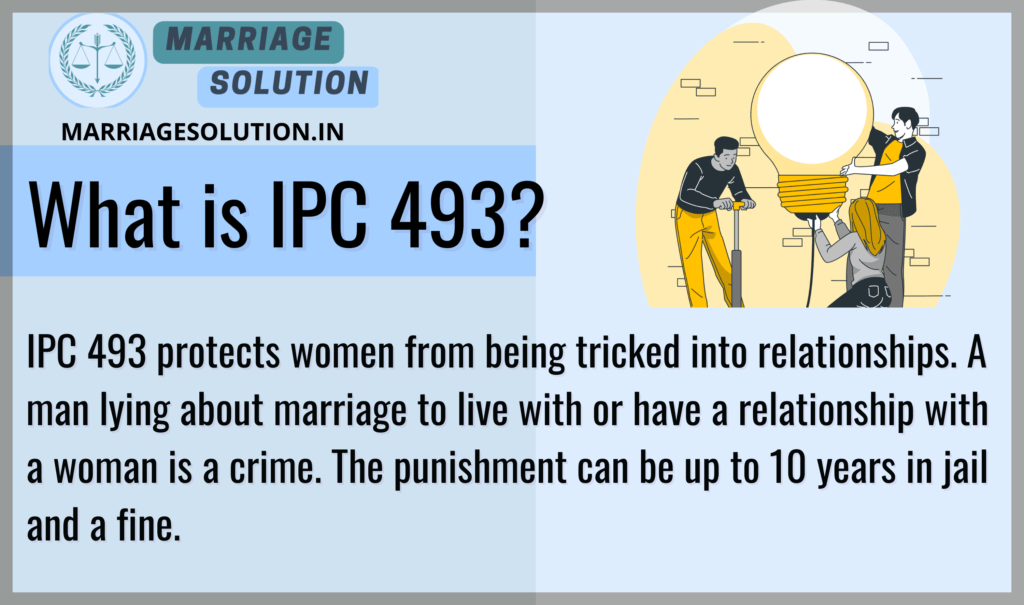Introduction of IPC Section 493
Indian law protects women (IPC 493). If a man lies about being married to live with a woman, that’s a crime. This law stops men from tricking women into relationships. It protects women’s safety and dignity.
What is 493 IPC ?
IPC 493 protects women from being tricked into relationships. A man lying about marriage to live with or have a relationship with a woman is a crime. The punishment can be up to 10 years in jail and a fine.

Section 493 IPC Overview
Imagine this: a man leads a woman to believe they’re married, living together or having an intimate relationship based on this lie. This is exactly what IPC Section 493 aims to stop. It protects women from being tricked into relationships under false pretenses of marriage.
Why is this Law Important?
Deception about marriage can have serious consequences for a woman. This law recognizes that and aims to provide legal recourse. Think about the emotional and social impact such a situation can have.
Key Points to Remember:
- The Offense: A man deceives a woman into believing they’re married, then lives with her or has a sexual relationship based on this lie.
- Protection for Women: The law safeguards women from exploitation through fake marriages.
- Punishment: The offender can face imprisonment for up to ten years and a fine.
- Bail: In most cases, bail isn’t automatic (non-bailable). The accused needs to request it from the court.
- Police Action: The police have the authority to arrest the accused and investigate without a court order (cognizable offense).
493 IPC Punishment
The punishment: The man can be jailed for up to 10 years.
Fine: Yes, the court decides the amount of money to be paid as punishment.

493 IPC bailable or non bailable ?
IPC 493 is generally considered a non-bailable offense, meaning the accused does not have an automatic right to bail and must apply for it in court.
493 IPC Cases
- Case Name: XYZ vs. State
- Details: A man was accused of deceiving a woman into believing she was married to him, leading to cohabitation. The court found him guilty and sentenced him to seven years of imprisonment and a fine.
- Outcome: The case highlighted the importance of this law in protecting women from deceitful practices.
- Case Name: ABC vs. State
- Details: In this case, the accused was acquitted due to lack of evidence. The woman failed to prove that she was deceived into believing the marriage was lawful.
- Outcome: The case underscored the need for strong evidence to secure a conviction under IPC 493.
- Case Name: DEF vs. State
- Details: A man was sentenced to ten years in prison after being found guilty of deceiving multiple women into believing they were married to him.
- Outcome: This case demonstrated the severe penalties that can be imposed for repeated offenses under this section.
Section 493 IPC in short information
| IPC Section | Definition | Offense | Punishment | Bailable |
|---|---|---|---|---|
| IPC Section 493 | Deceiving a woman into believing she is lawfully married to a man and then cohabiting or having sexual relations with her | A man deceiving a woman into thinking she is legally married to him, and then living or having sexual relations with her under that false belief | Imprisonment up to 10 years and a fine | Non-bailable |
493 IPC FAQs
What is IPC Section 493?
IPC Section 493 criminalizes deceiving a woman into believing she is lawfully married to a man and then cohabiting or having sexual relations with her under that false belief.
What is the punishment for violating IPC Section 493?
The punishment includes imprisonment for up to 10 years and a fine.
Is IPC Section 493 a bailable offense?
No, IPC 493 is a non-bailable offense.
Can the police arrest without a warrant under IPC Section 493?
Yes, it is a cognizable offense, allowing police to arrest without a warrant.
What is the primary purpose of IPC Section 493?
The primary purpose is to protect women from being misled into believing they are legally married, which can lead to exploitation and harm.
If you need support with court proceedings or any other legal matters, don’t hesitate to reach out for assistance.
Court or any other marriage-related issues, our https://marriagesolution.in/lawyer-help-1/ website may prove helpful. By completing our enquiry form and submitting it online, we can provide customized guidance to navigate through the process effectively. Don’t hesitate to contact us for personalized solutions; we are here to assist you whenever necessary!
